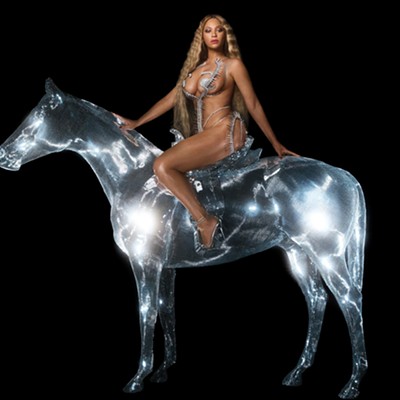If I could nurse a hangover with any living musician, it'd be Robert Earl Keen. If I could, I'd take him out for black coffee and cheese enchiladas with onions on top and just let him talk about whatever he wanted to -- chewing tobacco, six-shooters, farm-fresh onions -- whatever he wants.
Problem is, I'm not sure which Robert Earl would show up.
Just listen to his latest release, What I Really Mean. The disc begins with a mid-tempo kind of Western ballad, "For Love." Pedal steel whines in the background. A trebly electric guitar plays a melody on the low strings. Within the first 10 words of the song, Keen mentions "cattle." It's a cowboy song, about lost love and self-reconciliation. OK, so he's a country singer.
Jump to the second track, "Mr. Wolf and Mamabear." The band breaks into a kind of Irish skip as Keen unfolds a twisted and elaborate children's fable about a small-town crime, with all the characters represented by animals. Wolves are smoking opium, bobcats are killing peacocks. The detective covers the whole thing up so as not to implicate Sheriff Hog. Even the frighteningly unlyrical line, "The city council voted the insurance board to pay," comes off with merry aplomb. Here's Robert Earl as fabulist, with a devious grin.
But then he's the sweet husband on the title track, a bright-sounding but ultimately mournful tune about the band's ceaseless motion from one city to the next. "What I really mean," he says, "[is] I wish you were here."
What I really mean is: Who is this guy?
It's a fair question. The son of an attorney mother and an oil exec father (Robert Earl Keen Sr.), Keen Jr. grew up in Houston, wrote poetry in high school and enrolled at Texas A & amp;M intending to be a journalist. At 20, he rented a house in College Station and started playing guitar with his new neighbor, Lyle Lovett. As memorialized in a song each would later record, the two would crawl out onto one or the other's front porch in their underwear on Sunday morning, "strap on a banjo and a guitar and wait for the Presbyterians ... to come out of church, so we could play them a little gospel music." He took that fun-loving ethos to Austin after graduating from A & amp;M in 1980 and picked up gigs as a reporter at a local newspaper, and as a performer in the city's nightclubs. In 1984, he self-released his first EP, No Kinda Dancer and followed it with his first live album in 1988.
Eighteen years later, he's one of the most highly respected singer/songwriters on the circuit, the kind of writer that other writers like to cover. Presto.
Here's one reason why:
Track 4 on What I Really Mean -- "The Great Hank" -- is a sleepy, drunken country song with a high, narcoleptic pedal steel guitar in the background. Tumbleweed is tumbling, your eyelids are getting heavy. Robert Earl pipes up, speak-singing a baffling tale about watching a Hank Williams impersonator, in rhinestones and rouge, perform at some bar while the Astros are "silently beating the living crap out of Cincinnati on a TV above and a little to the left of the Great Hank Williams' head."
In the middle, he recalls driving through Texas in a Volkswagen bug when he was 16 years old. At the end of the song, he's driving through Philadelphia with a waitress, again in a VW bug, and you're left wondering if it's real, if it's the same car, if it's the same woman. What's real? What's not? It's the kind of song you gotta listen to about four times before you can even start to understand it.
Keen's not the first songwriter to borrow from Latin America's literary penchant for magical realism or the fantastic, but he might be the best one doing it today. That inclination reaches its apogee on this album with "A Border Tragedy." The disc's penultimate song is an amalgam of four parts -- a methodical banjo intro, a live mariachi recording, a verse from Johnny Cash's "Streets of Laredo" (sung by honky-tonk architect and old Hank Williams chum Ray Price) and a breathless Keen story about smoking Delicatos in the border town of Ciudad Acuna with Jaime and Umberto while a bunch of spring breakers (one of whom may or may not be "the virgin of Ciudad Acuna") laugh until they throw up. Weird: yes. Your typical country song: absolutely not.
The only Robert Earl Keen who doesn't show up on What I Really Mean is the Goofball, from such fan favorites as "Copenhagen" (an ode to chewing tobacco) and "Barbeque" (an ode to, well, barbecue). Only barely visible is the Trickster Deviant from songs like "Shades of Gray" and his No. 1 crowd request, "The Road Goes On Forever," a seven-minute-long crime spree song, which manages to please everyone from frat boys to aged outlaw country fans (and which once caused this writer's college buddy to dance so hard he broke his toe).
With so many personas, it seems a surprise that Keen has seen such success. One minute the guy's a country-western singer; the next minute he's Arlo Guthrie jonesing on Gabriel Garcia Marquez. He can't sing for shit: He's got no range, and his voice is piercingly nasal. His songs and albums all sound about the same, and he's given to lyrical celebrations of fishing and horseracing.
The key to his success, though, may lie in the road-weary tone of the afore-mentioned "What I Really Mean," or in the fact that his second album was a live recording.
Keen made his name in the 1980s and '90s by touring doggedly, sometimes visiting as many as 200 cities in a year. Fans covet his handful of live albums as much as -- if not more than -- they do his studio releases. Like Lovett, Jerry Jeff Walker, Todd Snider and nearly any other songwriter who's cut his teeth in Texas, Keen is apt to go on for as long as 10 minutes telling stories between songs. A master of comic timing, he lets the story unfold slowly and allows ample time for laughter. Sometimes his tales are set to music; sometimes they don't make a whole lot of sense.
Whatever the case, it's clear that when you invite one Robert Earl Keen to play in your town, he brings all the other ones too.
Robert Earl Keen at the Big Easy on Sunday, Jan. 15, at 8 pm. Tickets: $20. Visit www.ticketswest.com or call 325-SEAT















